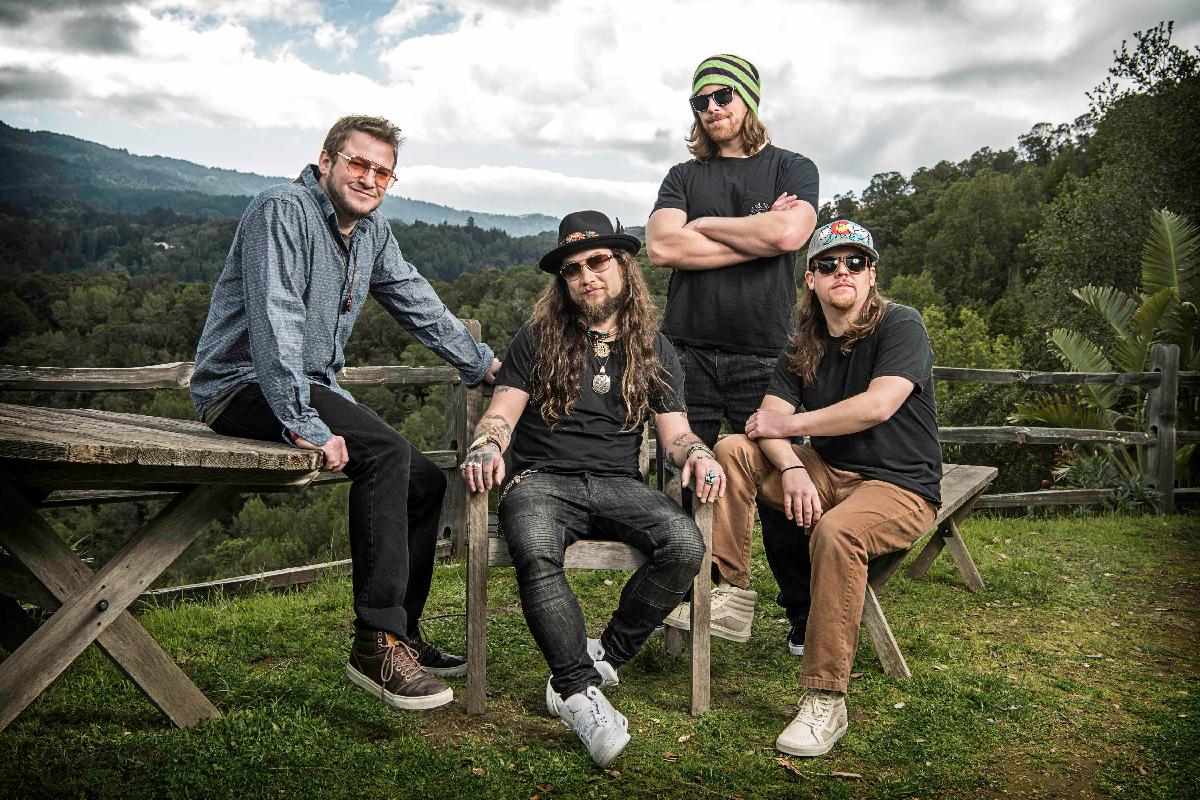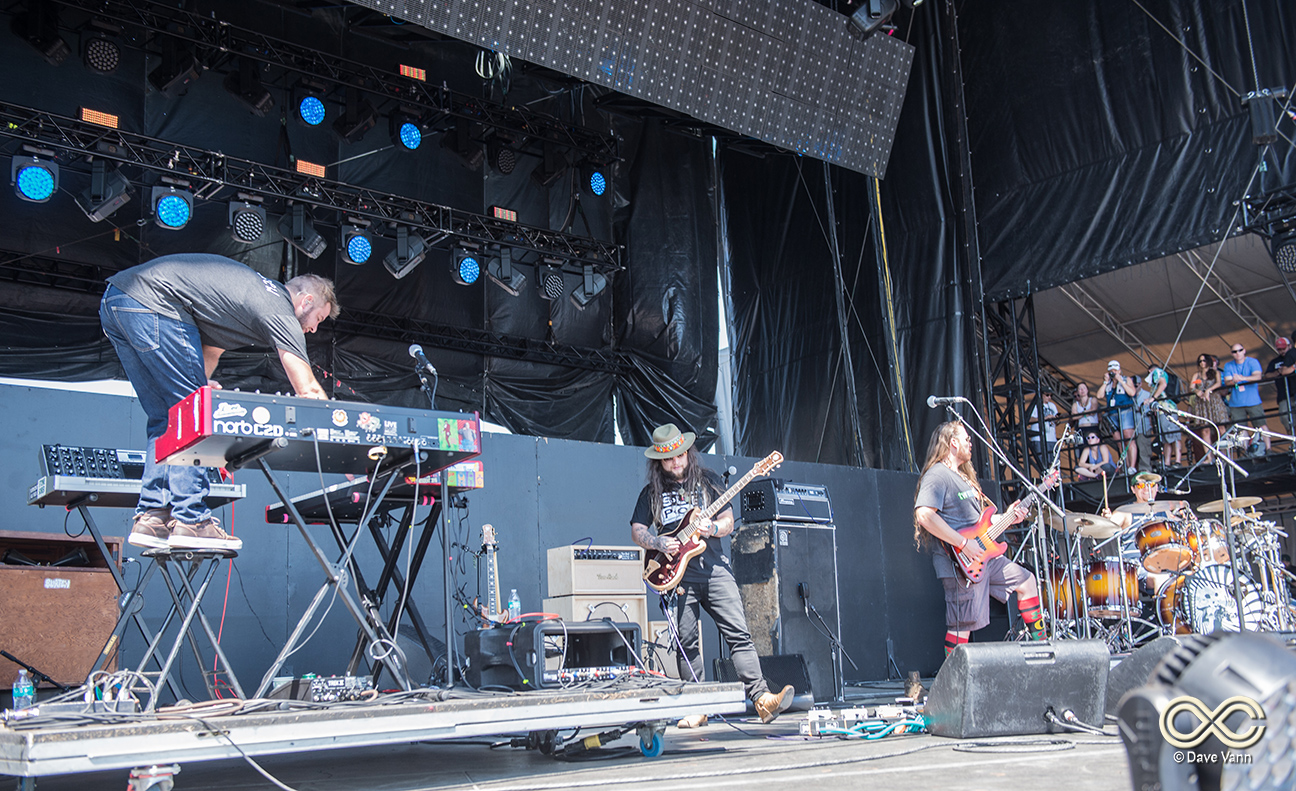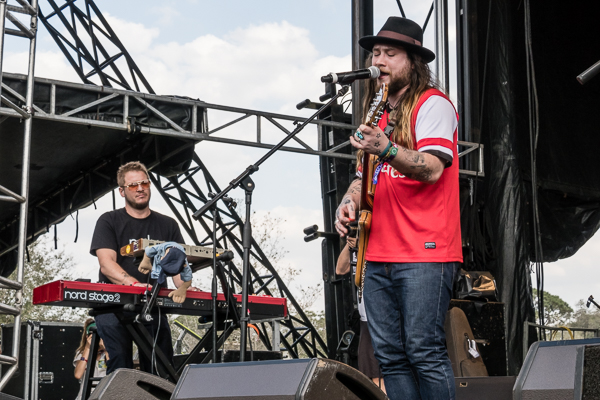Twiddle: The Art of Acrobatics

Twiddle certainly knows how to Tumble Down in style. In July 2016, the Vermont-based quartet launched a two-day festival at Waterfront Park in Burlington.
The group’s fourth and final set of their inaugural Tumble Down event began with a guest appearance by Holly Bowling on electric piano for the Twiddle original “Hattie’s jam,” which then led, as it typically does, into a version of “When It Rains, It Poors.” Bowling remained onstage for this tune and then three minutes into the song, Phish keyboardist Page McConnell walked out and joined the five musicians.
It was quite a moment, in particular, for Twiddle keyboardist Ryan Dempsey, who grew up in Burlington and idolized McConnell. In fact, Dempsey and Twiddle co-founding guitarist Mihali Savoulidis first bonded over their mutual enthusiasm for Phish’s “Stash” when they met as recent high-school graduates at an orientation for Castleton State College (now Castleton University) in 2004.
“I was ecstatic that Page came out to see us,” Dempsey acknowledges. “He was there watching the first set with his wife and we briefly talked. I realized I would beat myself up if didn’t ask him to come up and play. When he did, it was one of the greatest moments of my life.”
But wait, there’s more.
Tumble Down returned to Waterfront Park this past July and the version of “When It Rains, It Poors” that Twiddle performed during their second set on opening night featured another guest musician, none other than Grateful Dead bass player Phil Lesh.
“There was a moment during one of the jam solo parts of this song and I was looking at his hand, and he was doing this really cool run on his higher strings,” Savoulidis recalls. “So he was doing an ascending thing and I was doing a descending thing and we met in the middle on the same note, and it was a pretty cool little moment for me. But to have Phil and Page both play on that song is still kind of hard to believe. It’s one of those things that, when it was happening, I had one of those realizations like, ‘I’m going to remember this for the rest of my life. I’ll totally be recalling right now, forever.’ That’s a strange feeling to have.”
Dempsey recollects another resonant moment that took place at Castleton’s Casella Theater, while he was still an undergrad. “It was our first big show and we didn’t have that much material. It was packed, though, which probably meant about 200 people. And while we were in the greenroom underneath the stage, I could hear people stomping as loud as they could, screaming ‘Twiddle!’ I can remember thinking, ‘I want to do this for the rest of my life, if it can work.’”
Savoulidis shared similar sentiments about his career goals, but with less anxiety about the likelihood that they would come to fruition. While Dempsey would remain at Castleton to secure his baccalaureate, Savoulidis soon weaned himself off classroom attendance en route to a truncated collegiate career. Dempsey remembers he respected that his friend “knew what he wanted from the beginning, and he was going to get it. I was like ‘I need a plan B in case anything happens.’ But he was like, ‘No, we’re going to be musicians, and that’s the way it’s going to be.’”
Twiddle has emerged at the forefront of a new generation of improvisational polyglots, drawing on a variety of genres and referencing earlier groups who blended multiple styles of music into a new form. 
Savoulidis grew up in Maplewood, N.J., about 20 miles outside of Manhattan. During his teenage years, he’d take the train to explore the sights and sounds of the city. Beyond some underage barhopping and general cultural enlightenment in Greenwich Village, the budding guitarist made a steady effort to find his way into live performances whenever possible. An early formative experience was seeing The String Cheese Incident at Radio City Music Hall. (“Some guy miracled me a ticket and the show was phenomenal.”)
He is also of the “festival nation” generation and recalls that during the summer of 2001, at age 15, he attended both the Gathering of the Vibes and the Berkshire Mountain Music Festival. “My mom gave me the thumbs up because my older brother was going to take me. I completely immersed myself in what was happening. Until that point, my only live music experiences had been some Dave Matthews shows and a few other things, but certainly nothing as cool as Vibes. It was like some fairytale land that I didn’t think existed, and it did.”
“I went to Berkfest that same summer,” he continues. “I remember Leftover Salmon specifically. Blue Floyd was another band that stuck out. Steve Kimock, Soulive—I saw all these people for the very first time and when I got home from those festivals, I had this whole new world of music to listen to. It inspired me to want to get better at guitar. That’s what opened the door for everything that’s happening now.”
Dempsey, by contrast, had an altogether different upbringing. “Classical music kind of got me started. I was growing up in a Christian home, and some music was not allowed. I was homeschooled for five years, and my parents did their best to shelter me from a lot of secular music. It was all out of love,” he says. “Even the church I went to said that I wasn’t allowed to listen to Mozart because it wasn’t about God. So when we’d go on youth trips, they’d be like, ‘You can’t listen to Mozart because if he was in a bad mood and wrote music, then that might put you in a bad mood, and that’s not OK.’ But my dad’s really into jazz, so I had a lot of good jazz influences from him, and we listened to musicals and stuff like that. I wasn’t allowed to listen to Nirvana but I was sitting there learning Les Misérables songs at 11 or 12 years old.”
During high school, Dempsey found his way to Béla Fleck and the Flecktones and, by the time he met Savoulidis, he had come to appreciate Phish. Still, when it came to many of the artists who colored the guitarist’s musical palette, Dempsey was a complete neophyte. Savoulidis credits this unique perspective, and Dempsey’s ability to absorb a range of styles while maintaining his own musical personality, as a defining element of the band’s sound.
Their association began with some fortuitous seating selections at that Castleton orientation a couple months before school started, with Savoulidis settling in directly behind Dempsey. A conversation that began with casual remarks on the college’s acting curriculum swiftly gravitated to music. The two soon expressed a mutual interest in meeting up at Phish’s Coventry festival and then decided to foster a more immediate musical connection by fleeing the orientation and locating a piano so that Dempsey could jam with Savoulidis, who had brought his acoustic.
When Savoulidis had first mentioned that he was a guitarist, Dempsey asked him whether he could play a seventh chord because, as he now recalls, “everyone says they play the guitar. But then, when he played for me, I realized, ‘He’s really good. And way better than me.’”
By the time they entered college that fall, they already had plans to seek out some like-minded players and form a band.

Twiddle’s first official gig took place at Castleton’s Fireside Café in January 2005 and the group really picked things up in earnest the following year as Savoulidis decided to immerse himself in his music by jettisoning his academic pursuits.
“From the beginning, he never really planned to finish college,” Dempsey suggests. “His goal was to start a band. He just sat in the dorm room and would play music. I remember when we became roommates a year later, he just didn’t go to class. He paid for an extra semester, and I would keep trying to wake him up. He would be like, ‘No I’m just going to write music.’ When they kicked him out, he and I found a house together at Eagle Rock [in nearby Hubbardtown, VT] and we wrote music there. It was up in the mountains, and there was a waterfall in the background. It was just a beautiful place to write music in the middle of Vermont.”
During this era, Savoulidis focused on the playful yet complex material that would come to define Twiddle. The lineup remained in flux for a little while as the co-founders sought out a rhythm section that shared a similar spirit and could best serve the songs.
They found drummer Brook Jordan, who was then a high school senior in nearby Rutland, through a production of the musical Hair at Castleton. While playing in the musical’s orchestra pit, Savoulidis met bassist Billy Comstock, himself a Rutland High senior, who then introduced them to Jordan. Savoulidis credits the drummer with having “an incredible musical memory. He’s constantly listening to music and he can sing every word of a song if he hears it one time. We use that when we’re writing.”
For a period of time, both Jordan and Comstock were in the group until Comstock elected to pursue formal musical studies at Berklee College of Music. They replaced him with Zdenek Gubb, who Savoulidis hails as “the best bass player out there. It feels like every time he touches his bass, he’s got some new crazy riff or new cool thing he can do that I didn’t even think was possible.”
Dempsey remembers that they connected with Gubb through the social networking platform of the moment. “We found him through MySpace,” the keyboardist says with a laugh. “We’d heard about a bass player from the Manchester area of Vermont that was playing with the band, and he had a MySpace page. So Mickey [Mihali] and I got together, we looked it up, we listened to the band, and we were like, ‘Wow, he’s good. Let’s give him a call and audition him.’ He was like 16 or 17 at the time and, after high school, he immediately moved up to Eagle Rock with us.”
“When the four of us first started playing, it was all about ‘Look at me. Look how many notes I can play,’” he adds, “But now, we also realize that four different people are coming together. We’re finding our sound every day, listening and letting it build, letting it create itself. Everyone’s done a good job at collaborating, being connected and staying in it while improvising. We’ve grown so much over the past 10 years.”
Tumble Down has been something of a culmination for Twiddle. In the years leading up the festival’s debut, the group put in the roadwork, gradually expanding their geographic ambit from Vermont to New England to the entire Northeast, to the point where the quartet is now a true national act. During the past two years, Twiddle has welcomed peers and tourmates to the festival like Turkuaz, Cabinet, Midnight North, Aqueous, Madaila and Holly Bowling, as well as the aforementioned icons such as Lesh and McConnell.
Of course, bringing it all back home is also important to the narrative. “I grew up in Burlington, one of the most beautiful places in Vermont,” Dempsey says. “To be playing in that area, right on the water, watching the sunset, is such an amazing experience and it’s a great way to get fans to Burlington to see what Vermont’s all about.”
Another layer of the Burlington connection surfaced in 2017 when Twiddle brought out The Giant Country Horns, who once joined Phish for a celebrated 1991 summer tour (and a few subsequent shows). Given Twiddle’s rising stature, some bands might have been self-conscious or reluctant to extend such an invitation, but the fact that they weren’t wary of this, says something about the group’s sense of purpose and intent. They take their music, but not themselves, seriously.
“We really weren’t concerned about anything, other than the opportunity to work with people we admire,” Savoulidis affirms. “I have always been a huge fan of The Giant Country Horns and the work they did with Phish. Those are some of my favorite shows to listen to. Dave Grippo is in Burlington, we’ve chatted a bunch in the past and he’s sat in with Twiddle before. When I saw that some of the other guys were doing the Jazz is Phish shows in New York when we were going to be at Irving Plaza, I thought, ‘Man, we should see if we can get the three original guys.’ So we reached out and they were so good that we decided to add them to Tumble Down. I thought it would be cool to hear what they could do to our music. Why wouldn’t we want to do it if they were available? That’s kind of our attitude. Then we had the opportunity to work with them and it was a real blessing.” (They’ll also appear with Twiddle on New Year’s Eve in Albany, N.Y.)
Beyond all of this, Tumble Down is significant in its own right because festivals have been so consequential to the band. In 2012, Twiddle made the first of multiple appearances at the Gathering of the Vibes, the event that had once energized the 15-yearold Savoulidis. Subsequently, the quartet has made its way to Bonnaroo, Lockn’, Summer Camp, Wanee, Peach and many others.
The festival that may be nearest to the band’s heart, however, is Vermont’s Frendly Gathering, where Twiddle has appeared every year since snowboarders Danny Davis, Jack Mitrani and their Frends crew launched the campout in 2011. “When they started it, they were just throwing a party for friends and we were the local band,” Savoulidis notes. “But we went there and the overall vibe of the festival had such an impact on us—the caring nature of everyone and their motto ‘No I in Frends,’ putting the other fellow first and being good to your neighbor. That really resonated with us. I work harder at Frendly Gathering than at any other event in the summer. I try to play as much as I can, and meet and hang out with the fans and everybody who takes part in the festival. Frendly Gathering has been one of the biggest blessings for us in terms of cultivating a beautiful fan base with a great message. My lyrical message changed when I started to think about that.”
This shift in focus manifested itself on the band’s most recent recording project. In January 2015, Twiddle announced a Kickstarter campaign to support a new 2-CD studio record, their first such recording since 2011’s Somewhere on the Mountain, itself the follow-up to the group’s 2007 debut The Natural Evolution of Consciousness. After receiving funding, the band opted to release PLUMP in two parts. Chapter 1 came out in December 2015, with the second disc following this past April, as the group opted to take some time and re-enter the studio, scrapping some earlier sessions in order to release another timely statement in its own right.
“Our new conscious lyric style was all over Chapter One,” Savoulidis attests. “When the band first started out, we were focused on writing instrumental pieces of music that were diverse in genre and style, with a focus on improvisation. As far as the lyrics went, I was just making up characters and writing fun stories to go along with them. But now, I find myself writing more introspectively. Really, it’s just a message of positivity, that love is a powerful thing. It became more about writing personal stuff about my life that seemed to mean more to this beautiful community of people that we all relate to—growing up, getting older and dealing with life, day by day. Whereas, when I started, it was more silly.”
As he describes the evolution of his lyrics, it parallels the development of another Burlington-based act. This is why it’s ironic that—even as Twiddle increasingly connects with a swelling audience while delivering tales of empathy and respect—the band is sometimes criticized for its goofy name and occasional cartoonish lyrics by fans of another band that was once criticized for its goofy name and occasional cartoonish lyrics.
Twiddle is aware of this and, while it must be frustrating, Savoulidis suggests that the group has come to terms with it. “There are times when it feels like we’re the band everyone loves to hate. I understand both sides of it. I was a music fan, I get it. We never ever expect everyone to like our music. While I have a respect for every kind of music, that doesn’t mean I like it all.
“Everybody is welcome to their opinion, although sometimes I get the sense that there are people out there who are vocal about not liking us, who have never really listened to us. They might not like our name or the way that we look or the fact that we’re from Vermont or Burlington and that we’re a four piece. We’re used to it, although I have met a lot of people in the last year who said, ‘Hey man, I wasn’t really on board until I saw a show and you converted me.’ So I would say to everybody out there who thinks they hate us: ‘Come see us live. If you really don’t like it, that’s OK. We appreciate you coming to check it out.’ Everybody has an opinion. It’s all good.”



















